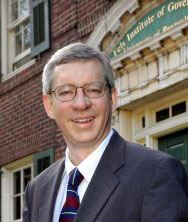The authors of this book contend that the civil service system, which was devised to create a uniform process for recruiting high-quality workers to government, is no longer uniform or a system. Nor does it help government find and retain the workers it needs to build a government that works.
The current civil service system was designed for a government in which federal agencies directly delivered most public services. But over the last generation, privatization and devolution have increased the number and importance of government’s partnerships with private companies, nonprofit organizations, and state and local governments. Government workers today spend much of their time managing these partnerships, not delivering services, and this trend will only accelerate in the future. The authors contend that the current system poorly develops government workers who can effectively manage these partnerships, resulting too often in a gap between promise and performance.
This short, lively, and bipartisan volume, authored by the nation’s leading experts on government management, describes what the government of the future will look like, what it will need to work well, and how in particular the nation can build the next generation of workers required to lead it.
Donald F. Kettl is the Robert A. Fox Leadership Professor at the University of Pennsylvania, where he is also director of the Fels Institute of Government and a professor of political science. Kettl is the author or coauthor of numerous books, including System under Stress: Homeland Security and American Politics (CQ Press, 2nd ed., in 2007) and The Global Public Management Revolution (Brookings, 2nd ed., in 2005). Patricia W. Ingraham is professor of public administration and political science and director of the Campbell Institute of Public Affairs at the Maxwell School, Syracuse University. Ronald P. Sanders is director of the Maxwell Center for Advanced Public Management in Washington, D.C., and was, from 1991 to 1995, the Department of Defense's senior career human resources management executive. Constance Horner, a guest scholar at the Brookings Institution, served in the Reagan administration as director of the U.S. Office of Personnel Management and in the Bush administration as assistant to the president, director of Presidential Personnel, and deputy secretary of Health and Human Services.

